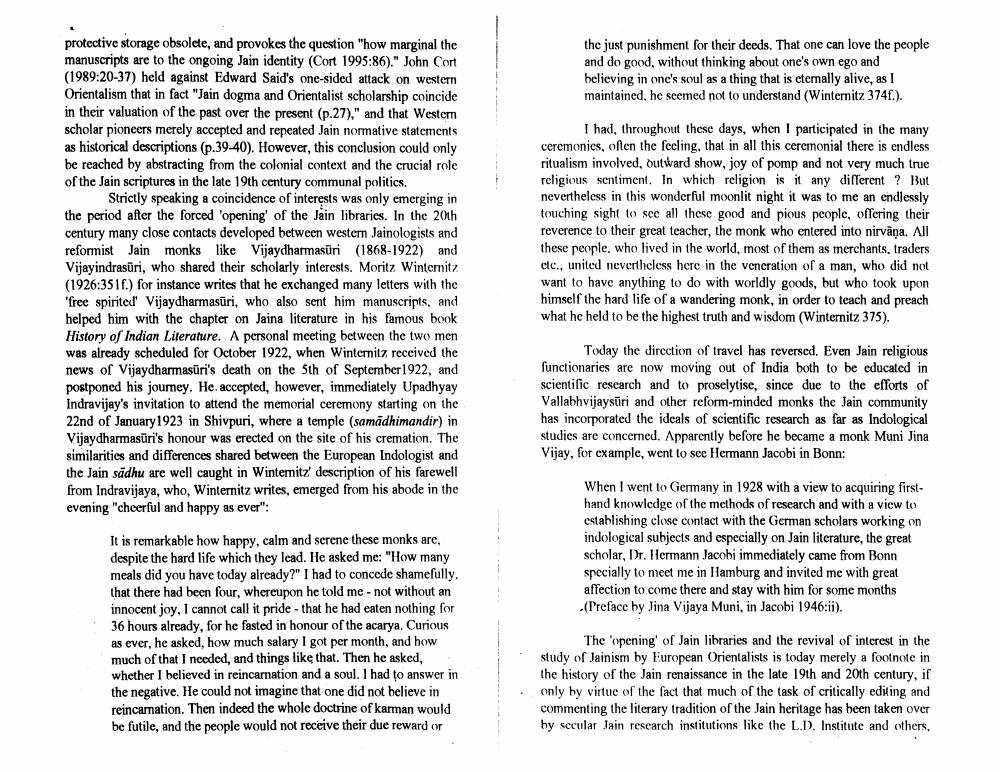________________
the just punishment for their deeds. That one can love the people and do good, without thinking about one's own ego and believing in one's soul as a thing that is eternally alive, as I maintained, he seemed not to understand (Wintemnitz 374f.).
protective storage obsolete, and provokes the question "how marginal the manuscripts are to the ongoing Jain identity (Cort 1995:86)." John Cort (1989:20-37) held against Edward Said's one-sided attack on westem Orientalism that in fact "Jain dogma and Orientalist scholarship coincide in their valuation of the past over the present (p.27)," and that Westem scholar pioneers merely accepted and repeated Jain normative statements as historical descriptions (p.39-40). However, this conclusion could only be reached by abstracting from the colonial context and the crucial role of the Jain scriptures in the late 19th century communal politics.
Strictly speaking a coincidence of interests was only emerging in the period after the forced opening of the Jain libraries. In the 20th century many close contacts developed between western Jainologists and reformist Jain monks like Vijaydharmasüri (1868-1922) and Vijayindrasüri, who shared their scholarly interests. Moritz Wintemnitz (1926:35 1f.) for instance writes that he exchanged many letters with the 'free spirited' Vijaydharmasüri, who also sent him manuscripts, and helped him with the chapter on Jaina literature in his famous book History of Indian Literature. A personal meeting between the two men was already scheduled for October 1922, when Winternitz received the news of Vijaydharmasüri's death on the 5th of September 1922, and postponed his journey. He accepted, however, immediately Upadhyay Indravijay's invitation to attend the memorial ceremony starting on the 22nd of January 1923 in Shivpuri, where a temple (samadhimandir) in Vijaydharmasüri's honour was erected on the site of his cremation. The similarities and differences shared between the European Indologist and the Jain sädhu are well caught in Winternitz' description of his farewell from Indravijaya, who, Winternitz writes, emerged from his abode in the evening "cheerful and happy as ever":
I had, throughout these days, when I participated in the many ceremonies, often the feeling, that in all this ceremonial there is endless ritualism involved, outward show, joy of pomp and not very much true religious sentiment. In which religion is it any different ? But nevertheless in this wonderful moonlit night it was to me an endlessly touching sight to see all these good and pious people, offering their reverence to their great teacher, the monk who entered into nirvana. All these people, who lived in the world, most of them as merchants, traders etc., united nevertheless here in the veneration of a man, who did not want to have anything to do with worldly goods, but who took upon himself the hard life of a wandering monk, in order to teach and preach what he held to be the highest truth and wisdom (Winternitz 375).
Today the direction of travel has reversed. Even Jain religious functionaries are now moving out of India both to be educated in scientific research and to proselytise, since due to the efforts of Vallabhvijaysüri and other reform-minded monks the Jain community has incorporated the ideals of scientific research as far as Indological studies are concerned. Apparently before he became a monk Muni Jina Vijay, for example, went to see Hermann Jacobi in Bonn:
When I went to Germany in 1928 with a view to acquiring firsthand knowledge of the methods of research and with a view to establishing close contact with the German scholars working on indological subjects and especially on Jain literature, the great scholar, Dr. Hermann Jacobi immediately came from Bonn specially to meet me in Ilamburg and invited me with great affection to come there and stay with him for some months (Preface by Jina Vijaya Muni, in Jacobi 1946:11).
It is remarkable how happy, calm and serene these monks are, despite the hard life which they lead. He asked me: "How many meals did you have today already?" I had to concede shamefully. that there had been four, whereupon he told me - not without an innocent joy, I cannot call it pride - that he had eaten nothing for 36 hours already, for he fasted in honour of the acarya. Curious as ever, he asked, how much salary I got per month, and how much of that I needed, and things like that. Then he asked, whether I believed in reincarnation and a soul. I had to answer in the negative. He could not imagine that one did not believe in reincarnation. Then indeed the whole doctrine of karman would be futile, and the people would not receive their due reward or
The 'opening of Jain libraries and the revival of interest in the study of Jainism by European Orientalists is today merely a footnote in the history of the Jain renaissance in the late 19th and 20th century, if only hy virtue of the fact that much of the task of critically editing and commenting the literary tradition of the Jain heritage has been taken over hy secular Jain research institutions like the L.D. Institute and others,




